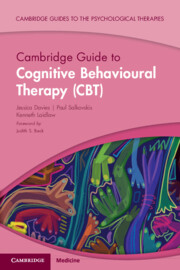Book contents
- Cambridge Guide to Cognitive Behavioural Therapy (CBT)
- Cambridge Guides to the Psychological Therapies
- Reviews
- Cambridge Guide to Cognitive Behavioural Therapy (CBT)
- Copyright page
- Contents
- Foreword
- A Note from the Series Editor
- Part I An Overview of the Model
- Part II Putting the Model of Cognitive Behavioural Therapy into Practice
- Part III Application and Adaptations for Mental Health Presentations
- Chapter 9 Adaptations of the Original Model of Cognitive Behavioural Therapy
- Chapter 10 Anxiety Disorders
- Chapter 11 Specific Phobias
- Chapter 12 Panic Disorder
- Chapter 13 Social Anxiety Disorder
- Chapter 14 Generalised Anxiety Disorder
- Chapter 15 Obsessive Compulsive or Related Disorders
- Chapter 16 Obsessive Compulsive Disorder
- Chapter 17 Body Dysmorphic Disorder
- Chapter 18 Illness Anxiety Disorder
- Chapter 19 Post-traumatic Stress Disorder (PTSD)
- Chapter 20 Depression
- Chapter 21 CBT for Psychosis and Complex Mental Health (PCMH)
- Part IV Application of Cognitive Behavioural Therapy in Different Populations and Settings
- Index
- References
Chapter 10 - Anxiety Disorders
from Part III - Application and Adaptations for Mental Health Presentations
Published online by Cambridge University Press: 18 November 2025
- Cambridge Guide to Cognitive Behavioural Therapy (CBT)
- Cambridge Guides to the Psychological Therapies
- Reviews
- Cambridge Guide to Cognitive Behavioural Therapy (CBT)
- Copyright page
- Contents
- Foreword
- A Note from the Series Editor
- Part I An Overview of the Model
- Part II Putting the Model of Cognitive Behavioural Therapy into Practice
- Part III Application and Adaptations for Mental Health Presentations
- Chapter 9 Adaptations of the Original Model of Cognitive Behavioural Therapy
- Chapter 10 Anxiety Disorders
- Chapter 11 Specific Phobias
- Chapter 12 Panic Disorder
- Chapter 13 Social Anxiety Disorder
- Chapter 14 Generalised Anxiety Disorder
- Chapter 15 Obsessive Compulsive or Related Disorders
- Chapter 16 Obsessive Compulsive Disorder
- Chapter 17 Body Dysmorphic Disorder
- Chapter 18 Illness Anxiety Disorder
- Chapter 19 Post-traumatic Stress Disorder (PTSD)
- Chapter 20 Depression
- Chapter 21 CBT for Psychosis and Complex Mental Health (PCMH)
- Part IV Application of Cognitive Behavioural Therapy in Different Populations and Settings
- Index
- References
Summary
The chapter will help you to be able to describe the development of CBT approaches for anxiety disorders, explain how the four key factors influence the level of perceived threat from a cognitive perspective, and consider the comparative purposes of habituation, cognitive restructuring and behavioural experiments in treating anxiety disorders
Information
- Type
- Chapter
- Information
- Cambridge Guide to Cognitive Behavioural Therapy (CBT) , pp. 93 - 97Publisher: Cambridge University PressPrint publication year: 2025
